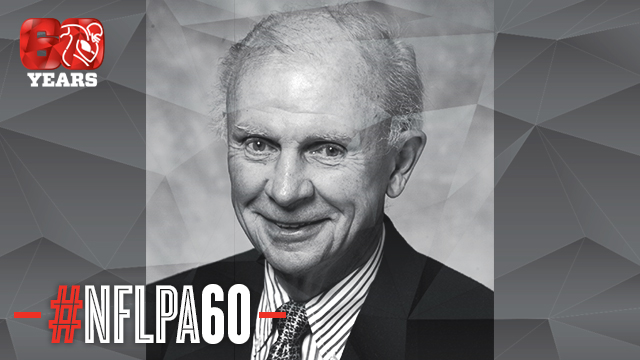60 Heroes: Ed Glennon's Counsel Key in Mackey Victory

By serving as trial counsel for the NFLPA in landmark cases, Ed Glennon’s name tends to get lost in the mix. But the work of the dogged attorney during the John Mackey and McNeil v. NFL cases as well as its subsequent impact on free agency and the league’s business model cannot be underestimated.
After the one-time railroad lawyer became a partner at the Lindquist & Vennum firm, Glennon played an integral role in many of the legal battles faced by the NFLPA from 1975 to 1992. As chief trial counsel for the players in the 1975 Mackey case, he interrogated or cross-examined more than 60 witnesses, dealt with more than 400 exhibits and helped generate more than 11,000 pages of transcript during the 55-day trial. In the end, Glennon guided the players to victory over a six-man legal team – one that included future NFL Commissioner Paul Tagliabue – as the Rozelle Rule that deterred free agency was ruled a violation of antitrust law.
Glennon was a part of two other key victories in the 1970s. He was class counsel in the Kermit Alexander case that led to a settlement of almost $20 million in damages to players. And in 1975, he represented a group of athletes from the World Football League, successfully arguing for an order to stop then-Commissioner Pete Rozelle from banning NFL teams from signing those players after the WFL went out of business.
In 1992, Glennon continued the fight for free agency when he served as local counsel during the McNeil trial. His cross examination of former Pittsburgh Coach Chuck Noll was particularly memorable. In it, Glennon revealed, among other things, that NFL coaches had guaranteed contracts and were able to move to other teams when those contracts expired, which was in stark contrast to the players. In the process, he showed the jury that if a head coach, who plays an important role on the team, had free agency, then a player, who is also important to the team, should have the same right without upsetting the “competitive balance” of the league.
Though Glennon passed away in 2009, his successful efforts as a trial lawyer for the NFLPA make him a revered hero in the union’s history.